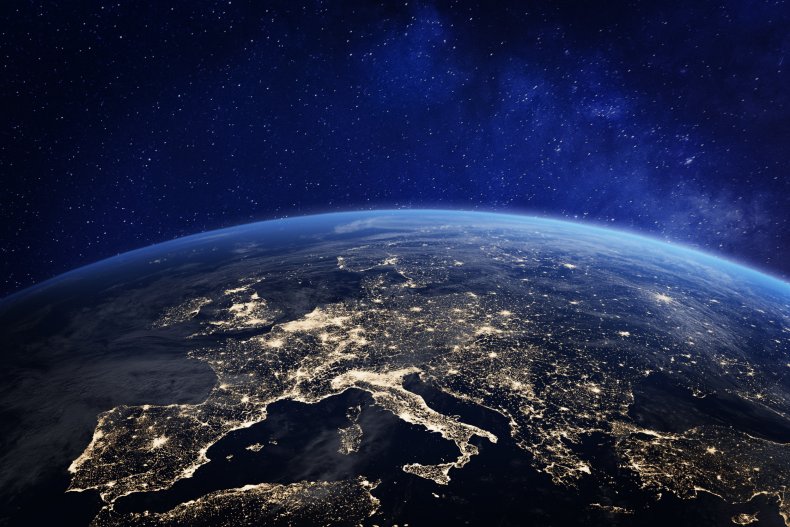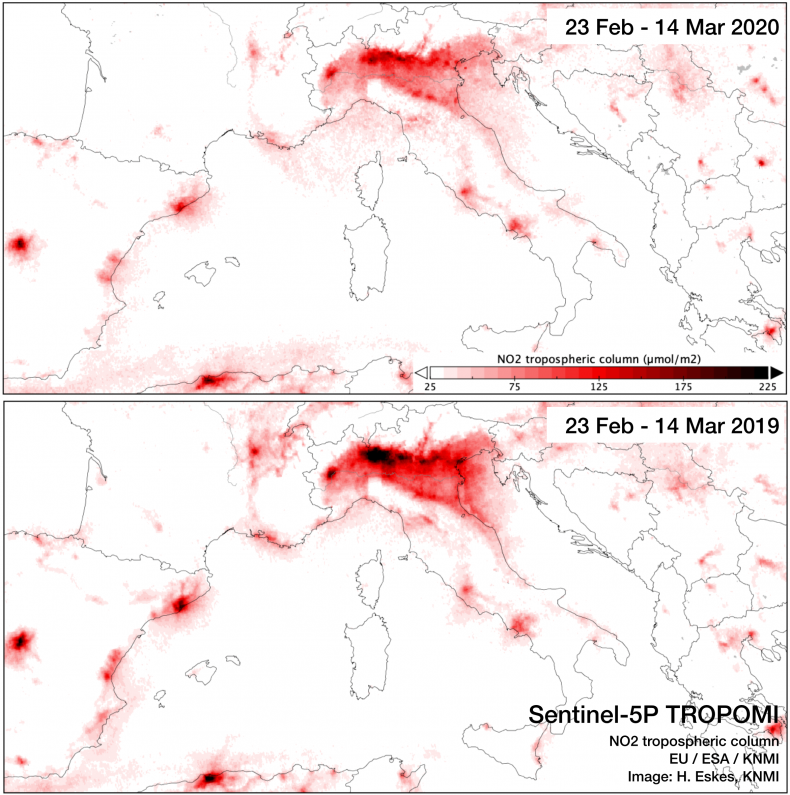The COVID-19 pandemic is wreaking havoc on countries around the world, causing a global health crisis while forcing economies to shut down in the face of strict quarantine measures. But the outbreak is also having an intriguing impact on Earth's environment, as nations restrict the movement of people.
One of the areas that scientists are witnessing a big difference is in air quality. It seems that the pandemic is already leading to huge reductions in air pollution in those regions that have been significantly affected by COVID-19—such as China and Italy—as industry, aviation and other forms of transport grind to a halt.
"Air pollution levels as observed by satellite are showing drastic improvements in many areas that have been undergoing restrictive quarantines due to COVID-19," Peter DeCarlo, an Associate Professor of Environmental Health Engineering at Johns Hopkins University, told Newsweek.
"Both China and Italy industrial areas are showing strong drops in nitrogen dioxide (NO2) corresponding to reductions in industrial activity and vehicular traffic. This isn't surprising given that vehicles and industry are the main source of NO2 and when these sources are essentially turned off, the atmosphere will clear up relatively quickly," he said.
Reductions on the amount of cars on the roads in some countries are one of the clearest impacts of work-from-home and social distancing policies, according to DeCarlo.
"But it's [also] very clear that airline passenger numbers are way down, as many countries introduce travel bans and meetings/conferences/work related travel is cancelled. Industrial activity is also reduced, but not necessarily to the extent of traffic. For example, power plants still need to run to produce electricity, water treatment plants still need to continue to treat water, etcetera," he said.
Pieternel Levelt from the Dutch Met office KNMI and Delft University of Technology in the Netherlands, echoed DeCarlo's comments telling Newsweek that there have been significant reductions in nitrogen dioxide over China and northern Italy in particular.
Examining data from the Dutch/ESA Tropomi instrument on the European Space Agency's Copernicus Sentinel-5P satellite, Levelt and her team noticed significant drops in NO2 levels from the Chinese New Year when quarantine measures came into effect in China, showing concentration levels which were 35 percent lower compared to the same period in 2019, and 50-60 percent lower for some individual cities. Over Italy, Levelt reported reductions in NO2 of up to 40 percent above cities like Milan, for example.

"We've never seen a strong reduction like that in nitrogen dioxide before. We measured over a couple of weeks because you want to be sure that weather is not the main source of a reduction in nitrogen dioxide, which could be the case due to rain or wind. We also compared with the same period last year to basically take care of seasonal effects," she said.
The COVID-19 pandemic is also likely to have a significant impact on other environmental factors, including the emission of greenhouse gases as the global economy heads into recession, according to Kevin Rose, Assistant Professor of Biological Sciences and Kolleck Career Development Chair in Freshwater Ecology at Rensselaer Polytechnic Institute.
"Economic recessions and resulting declines in energy use and population shifts can drive dramatic reductions in environmental impacts," he told Newsweek. "For example, the consumption of fertilizers, which harms freshwater quality, declined for many years in eastern Europe following the collapse of the Soviet Union. Greenhouses gases, such as carbon dioxide, have declined during many past recessions as energy-intensive economic activities slow. Quarantine protocols may also have a deep, but short-term, impact on greenhouse gas emissions and other pollutants, as fewer people are traveling and fewer businesses are operating."
Steven Davis, an Associate Professor in the Department of Earth System Science at the University of California, Irvine, said that the economy and emissions are tightly coupled.
"In recent years, we've emitted close to 500 tons of CO2 for every $1 million of global GDP—for example, 40 billion tons of CO2 for $88 trillion in 2019," Davis told Newsweek. "If this ratio holds, a decline in world GDP can be expected to cause a proportional decrease in global CO2 emissions."

"Past economic recessions we've seen global emissions bounce back quite quickly, though growth has been slower in the U.S. since it coincided with an underlying shift in the energy sector (gas.) Not clear how much this pandemic might be different in terms of its geography, longevity, and the activities it's affecting—for example, manufacturing, labor and travel," he said. "For example, past recessions haven't stopped people from commuting, so we haven't ever seen the huge and almost overnight improvements in air quality that we're now seeing in places like Southern California right now."
The effect on economic output as a result of the pandemic is is clearly demonstrated by countries like Italy, where electricity consumption has dropped as businesses shut down amid the quarantine, Bloomberg reported. These reductions in electricity consumption can potentially have a significant impact on emissions.
"It partly depends on where the drops occur and the energy mix in those areas, or the types of fuels used to generate that electricity," Christie Klimas, an environmental scientist at DePaul University in Chicago, told Newsweek.
"If the mix is predominantly coal, that will have a bigger pollution reduction impact than a more renewable mix of wind, solar, hydropower and nuclear, where pollution is already low," she said. "So reducing emissions from coal-fired power plants will have the most pollution reduction. And the energy mix is high in coal in areas like West Virginia."
Venice's clear canals
In some cities, such as Venice, the pandemic is having unexpected environmental effects. Several social media users have reported that the water in is famous canals—which are now virtually empty as a result of the coronavirus lockdown—appears to be unusually clear.
"Maybe this Virus is Mother Earth putting us in time-out for a while....while she cleans up the mess we made," one Facebook user, Elisabetta Cappellari, who posted pictures of the clear canals, wrote.
The unexpected clarity of the water isn't necessarily a sign of improved water quality, however. Perhaps the most important factor behind this phenomenon, experts say, is the unusual lack of boat traffic. Normally, the large number of boats which frequent the canals stir up sediments, making them float and increasing the water's turbidity—the cloudiness or haziness of a liquid. Now that there is a lack of boat traffic, the sediments stay on the bottom of the canals, making them appear much clearer than normal.
"In these days of quarantine the inner canals of Venice—the 'rii'—are more transparent,
clearer, than usual," researchers Roberto Zonta and Davide Tagliapietra from the Italian National Research Council, Institute of Marine Sciences, and Annamaria Volpi Ghirardini from the Ca' Foscari University of Venice told Newsweek. "Usually you cannot see the bottom of the rii even though they are very shallow, and you can see fishes just when they are close to the surface."
The huge reduction of tourist numbers and commuting workers in the city may also be leading to an improvement in the water quality due to a reduction of sewage discharges into the canals.
Wildlife
Quarantine measures appear to be having effect on wildlife around the world, as humans are increasingly confined to their homes. In Japan, for example, sika deer living in the popular tourist destination Nara Park were spotted wandering into urban areas to look for food after restrictions on visitors from China and South Korea came into place. Normally, tourists buy special snacks to feed the deer, and many of the animals have become accustomed to eating these treats.
In Thailand a video emerged of a mob of monkeys fighting over scraps of food in the city of Lopburi. The animals have come to rely on food given to them by tourists, but visitor numbers have dried up dramatically in recent weeks.
James Parkhurst, an Associate Professor of Wildlife Science at Virginia Tech, told Newsweek that in some of the busier metropolitan areas of the United States, which are now under 'shelter at home' orders, there could be some impacts on local wildlife.
"I suspect there likely will be far fewer food resources available in these urban environments as people are gone, restaurants have closed, businesses are slowing down or shuttering, and as a result, dumpsters remain empty and trash on the streets vanishes—could be an interesting study as animals that have come to rely on such resources now have to scramble to find alternate options," he said. "We may actually start to see an increase in some human-animal interactions as this search for food intensifies."
"The significantly lower level of human activity might lead to greater visibility of the diverse assemblage of species that live in urban areas and that often go unnoticed by the average human inhabitant," he said. "In response to the daily hustle and bustle of activity during daylight hours, many species adopt a nocturnal lifestyle in urban settings, but with less activity now, it would be interesting to see if anything adapts and takes advantage of the opportunity to roam during daylight."
The COVID-19 pandemic is already transforming the lives of millions of people across the globe, and right now minds are understandably focused on tackling the growing public health crisis. But what could the potential long-term implications be when it comes to the environment?
"In the long term, there are lots of folks talking about how the COVID-19 pandemic holds lessons and opportunities for environmental action," Davis told Newsweek. "For example, we will have a new baseline of what's possible to do online: telecommute, educate, shop, etcetera. And to the extent our government, institutions, and social networks succeed by coming together, we may feel more empowered to take on daunting issues like climate change and a transition to sustainable energy sources.
"On the other hand, hard economic times could undermine enthusiasm for environmental protection as people prioritize health, safety, and recovery. For example, if consumers turn their backs on solar and electric vehicles, the pandemic could stem the progress we've been making toward decarbonization."
"to have an impact" - Google News
March 24, 2020 at 04:59PM
https://ift.tt/3bpVGD8
Coronavirus Is Having a Major Impact on the Environment - Newsweek
"to have an impact" - Google News
https://ift.tt/2OtZUAR
Shoes Man Tutorial
Pos News Update
Meme Update
Korean Entertainment News
Japan News Update
Bagikan Berita Ini















0 Response to "Coronavirus Is Having a Major Impact on the Environment - Newsweek"
Post a Comment